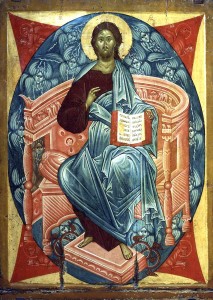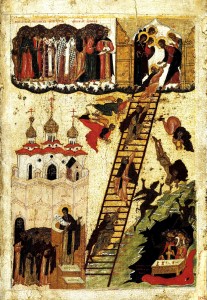 HALLOWED BE THY NAME
HALLOWED BE THY NAME
Just as we can blaspheme God and His name, so too God is glorified in us and through us. Why he has chosen to use us as His instruments of glory is beyond my understanding. But the writings of the fathers teach us that He is hallowed through us.
We hallow or sanctify the name of our heavenly Father by grace when we mortify our desire for material things and purify ourselves of corrupting passions. Sanctification is the destruction of ungodly desires within us. St Maximos links our desires to the “incensive power” within us that is often turbulent and fights for its will to be done. Holiness throws water on this fire.
THY KINGDOM COME
“Thy Kingdom come” is another way of saying “may the Holy Spirit come.” Putting away the aforementioned anger and ungodly desires through grace and our own will power, We are now made into a temple for God through the Holy Spirit by the teaching and practice of gentleness.
But what does it mean to be gentle? What about being a temple of the Holy Spirit? What does it look like for the Kingdom of God to actively thrive within us? Why do we pray that it becomes living and active in our lives right now?
For the remainder of the blog, I will attempt to answer those questions.
A Kingdom of Gentleness
St Maximos strongly links the Kingdom with the Holy Spirit, gentleness, meekness, and humility. These are what the Kingdom looks like.
When we hear that “the meek shall inherit the earth,” we are not simply talking about the world as we know it. The word ‘earth’ signifies the resolution and strength of inner stability, immovability rooted in goodness, that is possessed by gentle people. This state of stability exists eternally in the Lord. It is us reaching to Him and being unified to His divine energy, being healed and transformed by His grace, and being given a peace that surpasses all understanding.
Having put away sensual desires, gentleness is immune to both praise and blame as it seeks all in the true Source. We often seek praise and encouragement from others, and for some of us, it is difficult to do any good work without a bit of encouragement along the way.
But the soul united to God receives an abundant and overflowing amount of life and edification in its deep union with God. Therefore, neither praise nor criticism from others moves it because neither compare with the Eternal Fount flowing within.
For an example of this, see this short story from the desert fathers in which a man is told to go to a graveyard and insult and abuse the dead one day, and then go back and praise them the next day.
Unassailable Liberty
 Independence from people pleasing creates unassailable liberty as we are freed from the slavery of the passions and the servitude of pleasing others or fearing their criticisms. While I still have a long way to go in reaching the “unassailable liberty,” as St Maximos calls it, in my former years I was quite a people pleaser and was afraid of offending anyone. I wanted to be liked by nearly everyone. However, that desire to please others created within me a sea of restlessness and striving that did not begin to be healed until I started walking down the road of Orthodoxy.
Independence from people pleasing creates unassailable liberty as we are freed from the slavery of the passions and the servitude of pleasing others or fearing their criticisms. While I still have a long way to go in reaching the “unassailable liberty,” as St Maximos calls it, in my former years I was quite a people pleaser and was afraid of offending anyone. I wanted to be liked by nearly everyone. However, that desire to please others created within me a sea of restlessness and striving that did not begin to be healed until I started walking down the road of Orthodoxy.
In the unassailable liberty, rest and a state of inner peace are found. This peace cannot be shaken by events, circumstances, insults, compliments, or the words of others.
Desiring to see His disciples walk in this liberty, Jesus says, “Take my yoke upon you and learn from Me; for I am gentle and humble in heart; and you will find rest for your souls.” It is interesting that He calls the rule of the divine kingdom ‘rest’ because it confers on those worthy of it a lordship free from all servitude, especially that of pleasing others.
When we cast aside anger (by walking in humility and gentleness) and desire (by putting aside our will and wanting to people please), then through grace we allow the Holy Spirit to bear within us an exact spiritual likeness of Christ.
The above can be accomplished by allowing our intellect to be purified and stripped of anger and desire and affection for the body through the virtues. Our spirit then moves the nous/intellect toward undivided contemplation of the Logos. We then enter a mode of existence beyond moralism and even time itself.
On true human nature
In our most natural state of being human, we have one desire and that is Christ Himself: a complete and total union with Him, in Him, in us. Anger and desire of anything worldly or bodily gives rise to internal division. Presently we have unnatural tendencies competing with and overwhelming our true nature.
In all of us, it overshadows our true nature and causes us to believe that the sinful nature, being so strong, is our true nature. Sadly, our current state is double mindedness, an inner civil war in which our good created nature competes with the corrupt “old man” as the Apostle Paul calls it. But there is a great hope:
Naturally endowed with the holiness of the divine image, the nous [spiritual eye of the heart] urges the soul to conform itself by its own free choice to the divine likeness. In doing so, our soul participates, that is “lives in,” the great Kingdom which has its existence in God the Father and we become a translucent abode of the Holy Spirit.
In souls such as this, Christ always desires to be born in a mystical way, becoming incarnate in those who attain salvation and making the soul that gives birth to Him a Virgin Mother.
MORE ON GENTLENESS AND HUMILITY
The Kingdom is characterized by humility and gentleness of heart. But what are these things?
- A person is humble when he realizes that his very being is on loan from God.
- He is gentle when he realizes how to use the powers given to him in a manner that accords with nature, not using his power or gifts to gratify sensual desires or to puff up the ego, but rather to produce virtues.
- The humble and gentle of heart know only one pleasure, the marriage of the soul with the Logos in the process of theosis.
Previous Blog: Our Father who art in Heaven
Next up: Thy will be done on earth as it is in heaven
Citation note: rather than inserting St Maximos’ words in quotations, I decided to use italics in hopes that it would make this flow more easily and it would be more readable. All quotes are from his work entitled “The Lord’s Prayer” which can be found in its entirety in the Philokalia Volume 2, Faber and Faber Publishing.
Incredibly profound…. I think I have a long ways to go yet in this journey…